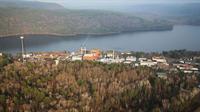CNL takes small-space experience to Lingen decommissioning
Canadian Nuclear Laboratories are testing the waters in new markets outside of Canada and the decommissioning of Lingen, Germany, is an opportunity for them to bring their know-how to the international stage

Related Articles
Canadian Nuclear Laboratories (CNL) has been running the National Research Universal (NRU) reactor at Chalk River in Ontario, Canada, for 60 years and will bring its tools and expertise to the decommissioning of the 268 MW Lingen nuclear plant in Germany, the company says.
After the NRU was closed March 31, 2018, bringing an end to CNL’s main missions of isotope production, fuel testing and materials research, the Canadian group has redirected its skills elsewhere.
“We’ve been decommissioning at the Chalk River site for the last couple of decades so we have a lot of experience of proper shielding and removal of safety systems,” says CNL’s General Manager for Reactor Decommissioning Kristan Schruder.
“From the science and technology (S&T) standpoint, Atkins Germany is working with the German supply chain for the main cutting tools, but there’ll be some specialised stuff for some tough-to-get areas and we’ll help them in potentially supplying specialised tooling.”
Lingen is smaller than a conventional plant and its decommissioning brings challenges in terms of restricted space, Steve Walters, Market Director of Reactor Decommissioning at SNC-Lavalin told Nuclear Energy Insider.
"There isn’t a great deal of space, so we’re going to use manipulators and a modular cutting system to cut from the inside of the reactor outwards. You take pieces off the reactor and you take asbestos off those pieces as they come out and then you package the disposal accordingly, so it’s slightly different than what you may have seen elsewhere,” says Walters.
Shared Challenges
Lingen’s decommissioning is an Atkins Energy Germany GmbH contract, through its wholly owned subsidiary SNC-Lavalin, and while they will perform at least half of the work themselves, they have also brought together a mainly German supply chain.
While Atkins Energy Germany have contracted CNL to support delivery, CNL are contracting Atkins Energy Germany to support the development of the tooling system, Walters explains.
“We recognized there was a synergy between what we were doing on the Lingen reactor and what CNL will have to do with some of their experimental reactors over at Chalk River. It's a good opportunity to share our experience and share our challenge,” says Walters.
In Lingen, located in Lower Saxony in northwest Germany, CNL will second conduct planning and field work as well as provide manufacturing and deployment services for some of the equipment that will be used to support reactor segmentation, which involves cutting the reactor in to smaller pieces, CNL says.
Lingen was fully shut down in 1977 and is being decommissioned through a deferred dismantling strategy, sometimes known as SAFSTOR, where the de-fuelled plant is monitored for up to sixty years before being completely decontaminated and dismantled.
CNL have modular and adaptable tooling that will be used for reactor segmentation, something they have been using at their Canadian sites, and this flexible approach gives them an advantage over challenges surrounding geometrical and material properties in Lingen, Walters says.
The 4-year contract is still in the initial phase, and CNL has only one engineer currently in Germany working with Atkins in the upfront planning stages. Field work is expected to start within the next year to a year-and-a-half and will require around three-and-a-half-years' work in total.
“We have our first engineer over there now working with them in the upfront planning stages and the next engineer is heading over in May. It’s really only launched in the last few months,” says Schruder adding that the company will have engineers at the beginning then hands-on individuals to operate the cutting tools and packet up the reactor.
Testing the Waters
CNL’s subcontract to aid in the decommissioning of RWE’s prototype boiling water reactor has given it the opportunity apply its skills outside of Canada and turn its hand to global projects.
“Germany is certainly a first step from a decommissioning standpoint ... in the recent time frame this is our toes in the water in supporting the supply chain,” Schruder says.
In Canada, CNL is currently segmenting and packaging seven heavy water moderated research reactors and demonstration CANDU reactors ranging from 20-250 MW, a job expected to take 7-15 years. This, says Schruder, allows CNL to develop the requisite skills that will allow the company to grow.
Now positioned as a national laboratory, CNL’s strategy includes renewing is science and technology capabilities to serve federal departments and agencies as well as extending its global reach to compete in commercial markets, the company says.
“Our primary role is the clean-up of our legacy sites, but if opportunities come forward, we want to see; can we capitalise that, can we support the different supply chains in order to deliver on these projects?" says Schruder.
"There’s a lot of decommissioning going on internationally, not so much in Canada, but in the United States and Europe it is really picking up and if we can add some value to that supply chain, we would definitely want to do that,” he says.
By Paul Day
